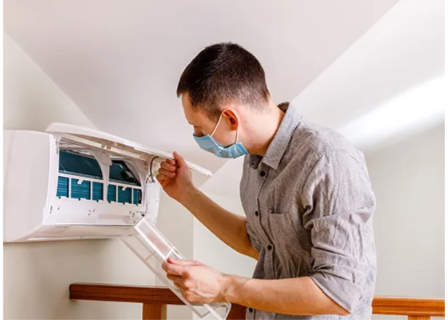Refrigerant and Noise: Why Your Air Conditioner Hums
Refrigerant and Noise Why Your Air Conditioner Hums. Air conditioners should operate without loud noises, yet strange sounds such as humming, hissing, and clicking indicate refrigerant-related issues.
The unusual sounds from air conditioners, beyond being bothersome, indicate major problems with leaks alongside improper refrigerant levels, which threaten system operational efficiency.
The Refrigerant-Noise Connection
An air conditioner depends on refrigerant since the substance travels through a sealed system to perform heat absorption and release functions. A system produces audible distress when refrigerant levels deviate because of either leaks or filling it too much. The compressor and fluid flow disruptions and pressure imbalances create sounds that disrupt air conditioner systems. To prevent costly repairs, one must understand how refrigerant flow connects to system problems before they grow worse.
Air conditioner repair in Mississauga https://superiorhvacservice.ca/mississauga/air-conditioner-repair/ through available services provides accurate diagnostics and silent effective maintenance to ensure system reliability. The personnel maintain system efficiency, including busy summer usage periods.
Common refrigerant-related noises include:
- Humming: Often caused by low refrigerant, forcing the compressor to overwork.
- Hissing: A sign of refrigerant escaping through a leak.
- Clicking: Can indicate pressure issues or loose components affected by improper levels.
- Gurgling: Suggests air or moisture in the lines, often linked to leaks.
Routine AC system diagnostics can catch these issues early, using tools like pressure gauges or ultrasonic detectors to pinpoint the source. Addressing noises promptly prevents damage and restores quiet operation.
Why Refrigerant Issues Cause Noise
Refrigerant problems don’t happen in a vacuum—they’re triggered by specific issues within the system. Here are the main culprits:
Leaks in the System
Leaks are the top cause of low refrigerant, letting fluid escape and disrupting pressure. Corrosion from humidity, vibrations loosening fittings, or external damage (like debris hitting the outdoor unit) can create leaks. A hissing sound often signals active leakage.
Improper Installation
Sloppy setups, like poorly brazed joints or loose connections, allow refrigerant to seep out over time. This can cause gurgling or humming as the system struggles to maintain pressure.
Over- or Under-Charging
Adding too much or too little refrigerant during maintenance throws off the system’s balance. Overcharging increases pressure, leading to clicking or straining noises, while undercharging causes humming as the compressor overcompensates.
Component Wear
Aging systems develop wear in coils or tubing, weakening seals and causing leaks. This often results in subtle noises like hissing or bubbling, especially in units over 10 years old.
A Mississauga homeowner once ignored a persistent hum, assuming it was “just the AC working hard.” By the time a technician was called, a leak had caused the compressor to overheat, costing $1,200 to repair. Services offering affordable AC repair in areas like Mississauga can prevent such outcomes with timely diagnostics.
Decoding AC Noises
Identifying the noise is the first step to fixing it. Here’s a quick “noise decoder” to guide homeowners:
- Low, Steady Humming: Likely low refrigerant, stressing the compressor. Check for leaks or call for AC system diagnostics.
- High-Pitched Hissing: Suggests a refrigerant leak, often from corroded lines. Requires professional inspection with UV dye or electronic detectors.
- Clicking or Ticking: Could be pressure imbalances from overfilled refrigerant or loose parts. A technician can adjust levels and tighten components.
- Gurgling or Bubbling: Indicates air or moisture in the lines, often tied to leaks or poor maintenance. Needs immediate attention to prevent coil freezing.
Homeowners should note when noises occur (e.g., during startup or constant operation) and report this to technicians. Avoid DIY fixes—refrigerants are hazardous and regulated, requiring certified handling.
Real-World Example: The Humming Apartment AC
A tenant in a Mississauga high-rise noticed their AC humming louder than usual during a heatwave. Thinking it was normal, they cranked the thermostat lower, worsening the strain. When cooling weakened, a technician found a pinhole leak in the evaporator coil, caused by corrosion.
The low refrigerant had forced the compressor to overwork, producing the hum. A $400 repair—sealing the leak and recharging the system—fixed it, but earlier action could’ve cut costs. This case underscores the value of addressing noises early with air conditioner repair in Mississauga.
Fixing Refrigerant-Related Noises
Resolving AC noises tied to refrigerant involves a systematic approach:
- Professional Diagnostics: Technicians use tools like leak detectors or pressure tests to confirm refrigerant issues. AC system diagnostics are critical here.
- Leak Repairs: Sealing leaks may involve replacing tubing, re-brazing joints, or swapping out damaged coils.
- System Tuning: Adjusting components to ensure smooth, quiet operation.
Professionals handling affordable AC repair prioritize precision, preventing over- or under-charging, which can cause new noises or damage.
Preventing Noisy Refrigerant Issues
Prevention is the best way to keep an AC quiet and efficient. Homeowners can take these steps:
- Annual Maintenance: Schedule inspections to catch leaks or pressure issues early.
- Clean Filters and Coils: Dirty components strain the system, increasing noise risks.
- Protect Outdoor Units: Use covers or guards to shield against debris or weather damage.
- Monitor Sounds: Report unusual noises immediately, noting their pattern and intensity.
A commercial property in Mississauga avoided major issues by scheduling biannual AC system diagnostics.
Environmental and Cost Considerations
Using improper refrigerants and allowing an incorrect amount of charge will result in warranty avoidance. Having AC repair solutions leads to high-quality maintenance services at reasonable rates.
Conclusion
A humming air conditioning system within Mississauga enhances how much we know about the importance of addressing noise problems.
Combining system diagnostics, professional maintenance, and proactive care allows air conditioners to operate in silence efficiently. Watching for unusual noises in your AC will help you maintain whisper-soft operation.
